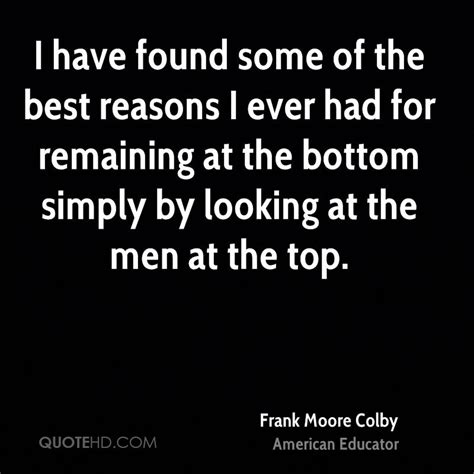A Quote by Frank Moore Colby
Literary people are forever judging the quality of the mind by the turn of expression.
Related Quotes
. . . you [film critics] always overstress the value of images. You judge films in the first place by their visual impact instead of looking for content. This is a great disservice to the cinema. It is like judging a novel only by the quality of its prose. I was guilty of the same sin when I first started writing for the cinema. . . . Now I feel that only the literary mind can help the movies out of that cul de sac into which they have been driven by mere technicians and artificers.
Watch how your mind judges. Judgment comes, in part, out of your own fear. You judge other people because you're not comfortable in your own being. By judging, you find out where you stand in relation to other people. The judging mind is very divisive. It separates. Separation closes your heart. If you close your heart to someone, you are perpetuating your suffering and theirs. Shifting out of judgment means learning to appreciate your predicament and their predicament with an open heart instead of judging. Then you can allow yourself and others to just be, without separation.
Quality doesn't mean deep blacks and whatever tonal range. That's not quality, that's a kind of quality. The pictures of Robert Frank might strike someone as being sloppy-the tone range isn't right and things like that-but they're far superior to the pictures of Ansel Adams with regard to quality, because the quality of Ansel Adams, if I may say so, is essentially the quality of a postcard. But the quality of Robert Frank is a quality that has something to do with what he's doing, what his mind is. It's not balancing out the sky to the sand and so forth. It's got to do with intention.
The more authentic you become, the more genuine in your expression, particularly regarding personal experiences and even self-doubts, the more people can relate to your expression and the safer it makes them feel to express themselves. That expression, in turn, feeds on the other person's spirit, and genuine creative empathy takes place, producing new insights and learnings and a sense of excitement and adventure that keeps the process going.
I've learned a lot of things about myself through singing. I used to have a certain dislike of the audience, not as individual people, but as a giant body who was judging me. Of course, it wasn`t really them judging me. It was me judging me. Once I got past that fear, it freed me up, not just when I was performing but in other parts of my life.



































